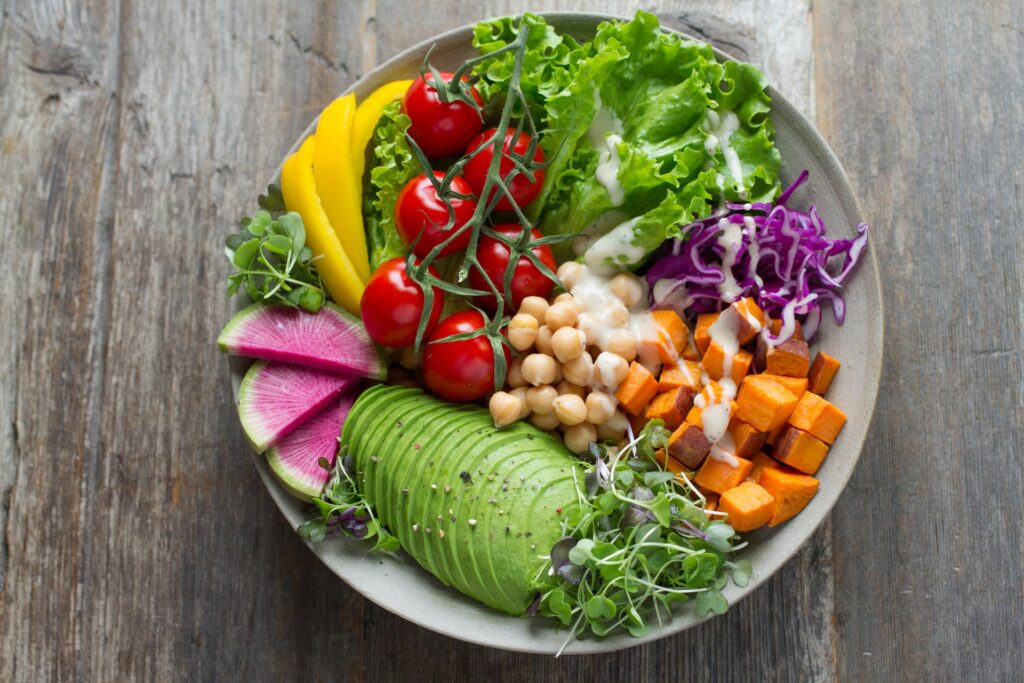What is vegetarianism
According to Wikipedia(1) „Vegetarianism is the practice of abstaining from the consumption of meat (red meat, poultry, seafood, and the flesh of any other animal), and may also include abstention from by-products of animal slaughter”.
Such diets have their advantages and disadvantages. Different foods are rich in different nutrients and eliminating some of them would not be an optimal solution for one’s health. On the other side, for example, most foods have also their disadvantages when consumed in excess amounts and animal products are not an exception to that. Depending on the type of chosen vegetarian diet, the effects of such diet on one’s health would slightly differ, however in this text I am going to focus on the type of vegetarianism defined by Wikipedia, which excludes red meat, poultry, seafood and flesh of any other animals from the diet.
Vegetarian diets have many pros and cons. Before I explain the potential benefits of food therapy for vegetarians, I’d like to talk about why a vegetarian diet can potentially be detrimental or beneficial for human health. To do that, the pros and cons of such a diet will have to be compared.
Vegetarian diet advantages and disadvantages
According to sources (2,3,4,5) following pros and cons of vegetarian diets have been identified
Benefits of vegetarian diet:
- Vegetarian diets seem to reduce the risk of heart disease, hypertension and type 2 diabetes
- They decrease the risk of certain cancers
- They reduce the risk of rheumatoid arthritis, kidney disease and gallstones
- Nutrient intakes tend to be closer to national recommendations
- Asthma symptoms can be reduced through such a diet
- The risk of osteoporosis might be decreased
- It may lower cholesterol levels
Disadvantages of being a vegetarian:
- Vegetarian diet can be low in vitamin B12, omega-3 fatty acids and other micronutrients of which some are classified as essential and required to supplement some of the nutrients or choose fortified foods
- It requires special attention if practised by pregnant and lactating women
- Some people can adapt such diets only to mask an eating disorder
- It is a bit more difficult to deliver the desired amount of protein for athletes following vegetarian diets
Nutritional therapy can be beneficial for vegetarians as it can focus on micronutrients that are typically missing from such a diet or solely on a certain person and the food they consume (which is even more relevant in this case). Implementing food therapy for vegetarians also educates them on what they potentially might be missing in their diet, which micronutrients they should supplement and what foods should they choose to stay healthy. For instance, if one’s diet seems to be deficient in certain nutrients, that can be spotted by the nutritional therapist and such a therapist can provide one with nutritional advice that aims to get rid of these deficiencies through the consumption of certain foods. It is to be remembered that in certain cases, some individuals (e.g. breastfeeding and pregnant women, people suffering from chronic, food-related diseases or the elderly) are recommended to consult their diets with professionals (such as nutritional therapists or dietitians) because improper dieting can compromise one’s health in such cases (or the health of the fetus in case of pregnant women, or the baby in case of breastfeeding women). The role of nutritional therapists is to adapt adequate advice and provide one with cues and instructions on how to eat properly to optimise their health and wellbeing.
To summarise, the biggest and the main benefit of utilising the nutritional therapy itself and its principles for vegetarians would be to ensure that essential micronutrients are provided in adequate amounts, which aids the body in proper functioning. It is recommended to do so as a lot of people claiming to be vegetarian might be confused and unable to provide enough micronutrients or adequate amounts of calories and correct proportions of macronutrients for their bodies and it is the job of a nutritional therapist to provide one with advice, instructions and knowledge essential to do so.
References:
- Wikipedia, Vegetarianism, accessed on 26/06/21, available at: https://en.wikipedia.org/wiki/Vegetarianism
- Meredith James, Pros and Cons of Being a Vegetarian: Different Types of Veggie Diets, accessed on 26/06/21, available at: https://tofubud.com/blogs/tips/pro-and-cons-of-being-a-vegetarian
- Ashley Marcin(2019), The Beginner’s Guide to Becoming a Vegetarian, accessed on 26/06/21, available at: https://www.healthline.com/health/becoming-vegetarian
- SPH Boston University, Vegetarianism, accessed on 26/06/21, available at: https://sphweb.bumc.bu.edu/otlt/mph-modules/ph/nutritionmodules/popular_diets/popular_diets6.html
- Yvette Brazier(2020), What to know about the vegetarian diet, accessed on 26/06/21, available at: https://www.medicalnewstoday.com/articles/8749




